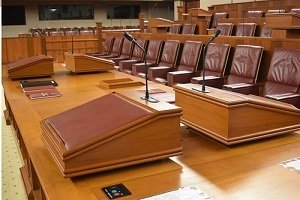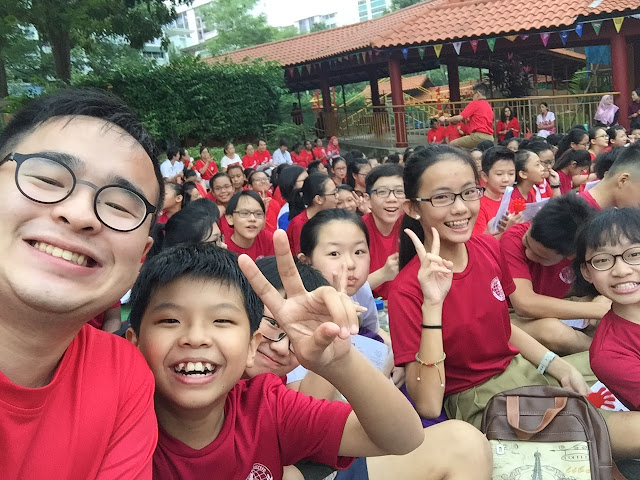From The Gallery: Are we too paranoid over the Public Order and Safety (Special Powers) Act?
by SEAN LIM
This is in review of the Public Order and Safety (Special Powers) Act, which was passed in parliament earlier this month. The Act aims to combat the threat of terrorism by limiting communications in an affected zone. SEAN LIM takes you through the controversy brought about by this Act.
THIS is by far the most literal OB marker – in a geographical sense
– we have come across so far, restricting communications within a certain zone
demarcated by the government.
Even though this might be considered a type of “calibrated coercion”
and “differential censorship”, as noted by Dr Cherian George in his lecture today, I deem it a timely and necessary measure.
The concern here is whether the Public Order and Safety (Special
Powers) Act (POSSPA) will be used to suppress free speech and expression. In
examining this case, we have to be aware that this is choosing between two
evils and having trade-offs. Do we want to compromise security under
extraordinary circumstances or to forgo (temporarily) the freedom of expression
and press?
Under such scenarios, do we want to continue with highfalutin ideals
of “freedom of expression…flow of information should go on…the press has every
right to cover this important news story” or let national security agenda
supersede it?
It depends on the social values prioritised by citizens of a country.
For example, Americans treasure their Second Amendment – the right to bear arms
– more than the dangers pose by the weapons, so we live and let live.
Singaporeans remain conservative when it comes to national security.
Survival instinct comes in due to the volatile region we live in. This is
reflected in a 2013 survey by Our Singapore Conversation, where security is
ranked as one of the top priorities among 4,000 respondents. Close to 700
ranked it as one of the top priorities, as compared to 100 for freedom of
expression.
If the survey was representative of our demographics, it shows how
Singaporeans prioritise security over freedom of expression. Hence, is it
inherently wrong for the government to enhance security at the expense of
freedom of expression? Since it is a direction most Singaporeans prefer, then shouldn’t
we live and let live? Moreover, we are talking about extraordinary
circumstances here, which may not even occur. It will still be status quo in
peace time.
Let’s reflect if POSSPA has practical consequences in our lives or
its problems merely a theoretical or even idealistic issue we argue upon.
1. For victims in affected area – it
is acceptable for them to send help messages, as reassured by Second Minister
for Home Affairs Josephine Teo.
2. For news outlets – They may
lose eyeballs without sensational news relying on live coverage, but does this
matter when lives are at stake? Anyway, in local journalism, journalists here
are already toeing the line and usually avoid sensationalising a story through
self-censorship, so will it stifle reporting with the new law? I doubt so.
Moreover, as mentioned by Mrs Teo in a related ST article, selected news
outlets are still allowed to report on the incident despite stop order being
issued. Stop order is meant for irresponsible reporting by the general public.
3. For next-of-kin/other
Singaporeans – they will continue to receive updates from relevant authorities,
so it is not a complete information blackout (onus is on the authorities to be
forthcoming with updates and not be perceived as a cover-up). Government has
been forthcoming with info in such circumstances thus far, if we look at the
2013 Little India riots as it unfolded, and also the terror scares at an MRT station last year. Some may complain slow release of information, but time is needed
to verify. The last thing we want is speculation (so authorities must do their
part and be forthcoming) and deliberate online falsehoods to spread in a
crisis, wrecking social order.
In fact, in my letter to The Straits Times on March 2, I was worried this Act will have consequences on press
freedom when it was first tabled in February. It was a relief Mrs Teo reassured
that this is not a deliberate attempt to stifle free expression in society, and
violations of the stop order will be reviewed on a case-by-case basis,
especially when it is a genuine attempt to help.
Coming to the second point, a main gripe has to be the expanded
powers vested to the Home Affairs Minister and the Police.
It is unlikely for our police to abuse their powers, looking at our
cultural norms, vis-à-vis hostile police culture in U.S, so are we being overly
paranoid for an unlikely hypothetical situation?
The minister, even when vested with ultimate power with no veto,
will he abuse it in reality? He has to consider the hefty political cost of
doing so. It is not in the Singaporean DNA to abuse powers so blatantly – the
minister will not get off easily, given Singaporeans are no longer as
politically naïve or ignorant.
In retrospect, for the Little India riots, which is very
exceptional, the police took a measured response in dealing with the rioters,
rather than being irrational and well, open fire at them like the 1989
Tiananmen incident in China.
Thus, it is not surprising that according to a 2012 World Values
Survey, 79.8 per cent of 1,972 Singaporeans surveyed had strong confidence in
the government. Similarly, confidence in the police is at a high of 79.4 per
cent.
Building up trust is difficult and takes a long time, yet easily eroded.
The government still enjoys high political capital. It is unlikely for those
vested with these “ultimate powers” to risk and abuse it.
Similar to the elected president, he or she has the veto powers over
key appointments in the government and the country’s budget, which is a powerful
force, but how likely is it for the president to turn rogue and abuse it? Not
in the Singaporean DNA, definitely. Stakes are too high for anyone rational to
rock it just for the sake of it.
Even though some has cried foul for vesting a disproportionate
amount of power to the minister, I believe it is there to play it safe. Under
extraordinary circumstances, assuming a genuine use of POSSPA, time is of
essence and it is important to empower the minister to act swiftly, rather than
be bogged down by political hurdle. Even so, to activate this new law, there
are certain conditions to be met, as stated in the report, so it is not exactly
a Hobbesian use by the minister.
As cliché it may be, we need to have good faith that the
government is doing the right thing, and this boils down to having the right
and responsible people in power – which is an issue of elections and voting,
not about the Act.
Although it is easier to be more repressive and authoritarian now with
the emergence of “strongman” leaders like Trump, Xi, Duterte and Kim, I do not
think this is the intention, if any, of our government to be so in this aspect.
I believe this is done out of good faith, or at least what it appears to me.
Aside from POSSPA, there are many “draconic” laws that remains, such
as Sedition Act, Official Secrets Act (OSA), Internal Security Act (ISA) and
Subjudice laws, but it has been used sparingly. There were instances when the
government could have clamped down on, such as Dominic Nathan’s The Straits Times cover-page report in
December 1996 over underground caverns which he could have gotten into trouble under
OSA, but would the government be harsh enough to do so?
(Credits: NewspaperSG)
Netizens commenting on
court cases online – Subjudice of court? Definitely. But would the government
want to take action on all? Perhaps not. (Let us ignore the ISA detentions over
1987 Operation Spectrum and 1963 Operation Coldstore, since it remains
contentious till date over its accounts).
The point is, the government can
always go harsh with its laws, but onus is on them whether they want to do the
politically costly thing, especially if the electorate sees them as
unreasonable from doing so.
Are we too paranoid over vesting the minister with too much power? I
believe in trusting them to do their job – isn’t that the social contract we have
struck with the government? It is good to question them over their actions (as
seen during the parliamentary debates or outreach sessions) but once over and
done with, let us be balanced and not take it to the extreme, be sceptical and
hinder their job. Reassurance is given, and we trust them to do their job, hoping
they don’t abuse their trust because nobody will benefit from it.
The ballot box is there for Singaporeans to overthrow a government
they have lost trust in. Will they want to risk it with blatant abuse and erode
people’s trust? Looking how governance has been for the past 50 years, I
foresee POSSPA is something they will do it carefully. Even opposition MP Sylvia Lim did not vote against the new law, but merely expressed her concern to ensure no misuse.
Let us not forget that in
times of crisis, lives matter first. This OB marker is there to ensure police
operation is not jeopardised and prevent speculation (e.g. claims that the
attack was carried out by a certain race, etc.) that might be detrimental to our
social fabric, should there be parties who intentionally want to cause chaos.
This is in line with the current government’s move to curb deliberate online
falsehoods, which is even more dangerous during a terror attack.




Comments